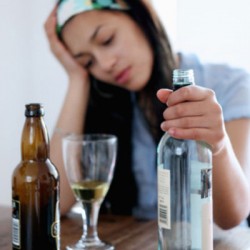Treat Alcoholism and Depression Together
A new study discovers a treatment regimen combining cognitive-behavioral therapy and medications for depression and alcohol addiction improves clinical outcomes.
Specifically, combining the antidepressant sertraline (Zoloft) with the alcohol dependence treatment naltrexone produced a 54 percent abstinence rate in patients with both major depression and alcohol dependence, whereas the rates were only 21 to 28 percent for patients taking a placebo, sertraline only, or naltrexone only.
This study shows an important advancement in the treatment of patients who live with both alcoholism and depression because the co-occurrence of these disorders is common in clinical practice, yet antidepressants alone are not sufficient for reducing excessive drinking in these patients.
All 170 patients also received cognitive-behavioral therapy, and the four treatment groups all showed clinical reductions in depressive symptoms over the 14-week study, which was conducted by Helen Pettinati, Ph.D., and colleagues of the University of Pennsylvania.

Alcoholism and depression may have a fighting change when treated together.
In addition to a higher abstinence rate, the group receiving combination treatment had a longer interval before resumption of drinking: a median of 61 days compared with 15 days for the other groups combined.
Serious adverse events were actually less frequent in the group receiving both medications, since the most common serious event was hospitalization for detoxification or rehabilitation.
“When depression and alcohol dependence occur together, each condition has a negative influence on the outcome of the other, so not only does this pairing of illnesses affect a lot of patients, it also makes the individual disorders worse,” Dr. Pettinati stated.
“Combining sertraline and naltrexone could be a practical approach for these patients because both have FDA approval.”
The study appears in AJP in Advance , the online advance edition of The American Journal of Psychiatry (AJP), the official journal of the American Psychiatric Association.
Source: American Psychiatric Association
